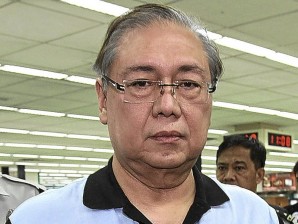Mike Arroyo forgoes foreign trip
MANILA, Philippines—Jose Miguel Arroyo, husband of former President Gloria Macapagal-Arroyo, has withdrawn a motion seeking permission to travel to Japan and Hong Kong after the court required him to waive his right to ask for the quashing of a graft charge that he sold two used helicopters at brand-new prices to the Philippine National Police in 2009.
As a result, he was not arraigned before the Sandiganbayan’s second division on Friday. His lawyer, Ferdinand Topacio, had earlier asked for a “conditional arraignment” without prejudice to their right to file pleadings to reverse the finding of probable cause against him.
“No, not anymore,” Arroyo replied when asked if he was still leaving after Friday’s hearing.
Another division of the Sandiganbayan hearing another graft charge earlier gave Arroyo leave to travel abroad.
But second division Justice Teresita Diaz-Baldos said that was different because Arroyo had already been arraigned before the fourth division.
Article continues after this advertisementAfter conferring with his client, Topacio told the court they were withdrawing the motion to travel as they would not want to lose the right to question the basis of the Ombudsman for filing the graft charge.
Article continues after this advertisementOn June 6, the Office of the Ombudsman filed a graft charge against Arroyo in the Sandiganbayan, accusing him of selling his two Raven I helicopters to the PNP and passing them off as brand-new.
Also charged were 20 active and retired PNP officials, led by then Director General Jesus Verzosa, and Hilario de Vera, president of Manila Aerospace Products Trading (Maptra), a PNP supplier. The graft charge has provisions for bail, set at P30,000 for each of the accused.
A number of the police officials, including Versoza, have retired, and 13 of those still in active duty, two of them with the rank of chief superintendent, were ordered dismissed from the service.
The respondents stand accused of violating Section 3 (e) of the antigraft law, which penalizes acts of public officials that cause undue injury to the government or give a private party any unwarranted benefits or advantage.
